Physical Address
304 North Cardinal St.
Dorchester Center, MA 02124
Physical Address
304 North Cardinal St.
Dorchester Center, MA 02124

A few years ago, coding meant staring at a blank screen, trying to remember syntax, and spending hours fixing bugs you couldn’t even see. Developers had to rely only on their knowledge, long threads on Stack Overflow, and trial and error. But things are changing—and fast.
Today, AI coding tools are quietly reshaping the way we build software. Imagine having a smart assistant by your side, suggesting code as you type, spotting mistakes before they become problems, and helping you code smarter—not harder. It’s not science fiction. It’s happening right now.
With the growing demand for faster development and cleaner code, the need for automation and innovation in programming has never been greater. AI for programming is no longer a luxury—it’s becoming a must-have.
In this blog, we’ll explore five of the best AI coding tools that are set to stand out in 2025. Whether you’re just starting out or you’re already deep into full-stack projects, these tools can make your coding journey smarter and faster.
If you’ve ever spent hours fixing a bug or rewriting the same block of code over and over, you’ll understand why AI coding tools are gaining popularity. These tools are designed to make coding faster, smarter, and a lot less frustrating.
The real power of AI programming tools lies in their ability to assist with everyday tasks. They can suggest the next line of code, fill in common functions, highlight errors instantly, and even write entire sections for you. This kind of smart coding helps reduce repetitive work and keeps you focused on problem-solving instead of typing.
One major advantage is speed. With AI handling small but time-consuming tasks, development cycles become much shorter. Projects that might have taken weeks can now move faster from idea to reality. This saves time, cuts costs, and allows developers to build more in less time.
There’s also the benefit of writing better code. AI tools can spot common mistakes, suggest improvements, and encourage clean, readable code. Over time, this leads to fewer bugs and less time spent on debugging.
We’ve come a long way from the days of basic text editors and manual testing. Today’s development environments are smarter, thanks to the integration of AI. Tools like GitHub Copilot and Tabnine are already changing how people code, and the trend is only growing. In fact, a survey by Stack Overflow in 2023 found that over 70% of developers who tried AI coding assistants said they were more productive.
The benefits of AI coding tools are hard to ignore. They’re not here to replace developers—they’re here to support them, helping us work faster, make fewer mistakes, and unlock new levels of creativity in programming.
AI coding tools are changing how developers write, review, and test code. Whether you want to speed up your workflow or reduce mistakes, the right AI tool can make a big difference. Below are five of the best AI coding tools in 2025 that are helping developers code smarter and faster.

Overview:
GitHub Copilot is one of the most popular AI coding assistants. Built by GitHub and OpenAI, it works inside your code editor to suggest entire lines or blocks of code based on what you’re writing.
Key Features:
Use Cases:
Pros:
✅ Fast and helpful suggestions
✅ Saves time on routine coding
✅ Easy to set up and use
Cons:
❌ May suggest outdated or insecure code
❌ Requires an internet connection
Pricing:
Official Site:
https://github.com/features/copilot
Overview:
Tabnine is an AI tool focused on smart code completion. It uses machine learning to predict and suggest code as you type, helping developers stay in the flow.
Key Features:
Use Cases:
Pros:
✅ Very fast code suggestions
✅ Strong privacy options
✅ Works offline (Pro version)
Cons:
❌ Basic free version has limited features
❌ Less advanced than Copilot in some cases
Pricing:
Official Site:
https://www.tabnine.com
Overview:
CodeWhisperer is Amazon’s answer to AI-powered code generation. It works best with AWS services and helps developers write code faster and more securely.
Key Features:
Use Cases:
Pros:
✅ Great for AWS developers
✅ Strong focus on code security
✅ Free for individual use
Cons:
❌ Limited outside AWS use
❌ Still improving language support
Pricing:
Official Site:
https://aws.amazon.com/codewhisperer
Overview:
Replit Ghostwriter is an AI coding assistant built directly into the Replit online IDE. It’s perfect for beginners, students, and those who prefer a browser-based coding environment.
Key Features:
Use Cases:
Pros:
✅ No setup required
✅ Great for beginners and learners
✅ Offers explanations for code
Cons:
❌ Best suited for small to medium projects
❌ Limited integration with external tools
Pricing:
Official Site:
https://replit.com/site/ghostwriter
Overview:
CodiumAI focuses on writing smart tests and improving code quality. It analyzes your code and generates test cases automatically, making it easier to catch bugs early.
Key Features:
Use Cases:
Pros:
✅ Saves time on writing tests
✅ Improves software quality
✅ Easy to use inside popular IDEs
Cons:
❌ Limited language support (for now)
❌ Still a newer tool—features growing
Pricing:
Official Site:
https://www.codium.ai
These AI coding tools each offer something unique—whether it’s writing code, completing it faster, or improving how you test and secure it. Depending on your needs, you might even find that using a combination of tools gives you the best results.
| Tool Name | Language Support | Key Features | Free Version Availability | Ideal For |
| GitHub Copilot | Python, JavaScript, Ruby, Go, and more | Code suggestions, works in VS Code, JetBrains, and more | Free for students, paid plans | Beginner, Pro |
| Tabnine | Multiple languages including Python, JavaScript, Java | Code completion, supports private models, offline mode | Free, paid plans available | Beginner, Pro |
| CodeWhisperer | Python, Java, JavaScript, TypeScript | AWS-focused, real-time suggestions, code security scanning | Free for individual use | Pro, Enterprise |
| Replit Ghostwriter | Python, JavaScript, Ruby, HTML/CSS | In-browser IDE, code suggestions, explanations | Paid plans, no free version | Beginner, Educational |
| CodiumAI | Python, JavaScript | AI-powered code analysis, test case generation, quality checks | Free, paid plans available | Pro, Enterprise |
Not every AI coding tool is the right fit for everyone. The best choice depends on how you code, what you’re working on, and what kind of support you need.
Start with the basics: what programming languages do you use? Some tools are built for Python and JavaScript, while others support a wider range. Make sure the tool you pick speaks your coding language.
Next, think about where you do most of your coding. If you use an IDE like VS Code, JetBrains, or an online platform like Replit, you’ll want a tool that fits smoothly into that environment. A good tool should give you suggestions in real time without getting in your way.
Cost is another thing to consider. Many AI coding tools offer free versions, but advanced features usually come with a price tag. If you’re a beginner, the free tools might be all you need. But if you’re working with a team or handling big projects, investing in a paid plan might save you more time (and headaches) in the long run.
In short: start with what you use, what you need, and what fits your budget. Whether you’re just getting started or coding at scale, there’s an AI tool out there that can make your life easier.
The future of AI in software development looks exciting—and it’s only getting better. In the next few years, AI coding tools will become even more advanced. They won’t just suggest code or fix bugs—they’ll understand entire projects, help plan architecture, and even offer creative solutions based on past work.
As these next-gen AI tools for coding evolve, we’ll see even closer collaboration between humans and machines. Developers will still be in control, but AI will handle more of the heavy lifting—like testing, debugging, and writing repetitive code—so people can focus on solving bigger problems and building smarter solutions.
We can also expect AI coding tools to become more personalized. Instead of one-size-fits-all, tools will learn from your coding style and projects to give tailored help. For teams, this means smoother workflows and faster development cycles.
In short, AI won’t replace developers—it will empower them. The future of AI in software development is all about working together: human creativity and machine speed, side by side.
AI coding tools are transforming how we write and improve code. They help developers code smarter, faster, and with fewer errors. Whether you’re a beginner or an experienced programmer, these tools can make a big difference in your development process.
If you haven’t tried them yet, now is the perfect time to explore the possibilities AI can offer. From code suggestions to bug fixes, there’s an AI tool out there that can help you level up your coding skills.
Have you used any of these AI coding tools? Share your experiences in the comments below, or feel free to subscribe for more tips and updates!
[…] this blog, we’ll explore some of the best AI design tools available in 2025. Whether you’re a beginner or a pro, these platforms can help you save […]